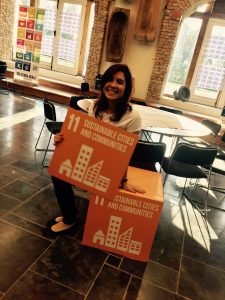By the age of fourteen, I was made to search for my first employer.
It was part of the German curriculum that in high school I realize a one-week internship. For that purpose, we were trained to create a CV. Now, the CV of a high school teenager is exactly what one would expect from her: short. But I remember while crafting that 30-word document, that the question I was asked that day began ruminating in my head: “What do you want to do for your internship?” It sounded like “What choice will you make now that will define your life path?”
I grew up with an engineer as a father and a dancer as a mother – jobs on very different ends of the spectrum – and both complained about their jobs regularly, though in very different ways. I learned that both had jobs they didn’t consider ideal, and as such were crossed off my “potential future” list. Happiness, I determined at an early age, was important for my work, because I saw that neither status nor financial income was completely satisfactory for the family I watched while growing up.
We spend a minimum of eight hours every day at work. Particularly our generation has understood that salary and benefits, or dress codes and location don’t make our decision where we spent up to 50% of our time. Yet, a large variety of other factors do – it’s combination and density defined based on personality and culture of the job-seeker.
In polls and surveys, I learned when studying organizational psychology in college, the typical “flexibility at the workplace”, “a great boss” and “the option to travel” held the peak ranking when it came to the search for the ideal labor option.
When I came close to graduating, I filtered job options after what I had learned would bring the highest happiness in my professional life. It was then when I joined a Not-For Profit as a volunteer, as a hobby. It was then, when I applied to become part of a national executive board of that Not-For Profit in a small country in the Caribbean, that I understood the true aspects of happiness at the workplace.

The main lesson I took away from my years working in that organization is that what I was mainly looking for wasn’t happiness, but meaning. Happiness at work, as well as in any other place, comes from a focus on what you get from others, while meaning is based on the act of service for the so-called greater good.
In the conventional sense, working for AIESEC on a full-time basis is everything but ideal. Speaking from my own experience, there were many aspects that reduced comfort: The minimum salary, the amount of travel and constant time-zone hopping, the inner sense of urgency you get from only having one year to achieve and complete all the goals you’ve been dreaming of since joining the organization, the knowledge that every year you choose to spend there, you are making a conscious choice to put your so-called “rest of your life” on hold.
Waking up every day with a clear sense of purpose and service to the cause you care about and the people you work with, I learned, is all the aspects it takes for a job to be called “ideal”.
To answer “What is your perfect job?” you must first answer “Who are you?” as finding meaning in any activity will only become clear once you understand your values.
No salary, working-from-home-days or exciting corporate culture equals the soul-balming effect as thriving on something that is bigger than oneself has.

I count myself lucky to not have had to work twenty years in cubicle offices to know that when I search for a work that fills me with happiness, I need to start by finding meaningful action for my every day. Which is pretty practical actually – after all, the world has never been as unfinished as now, so why chose not choose to create meaning for the one you live in?
13
Leave a Reply